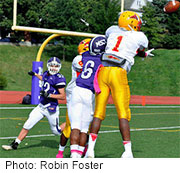
WEDNESDAY, June 5 (HealthDay News) — Youth football players are much more likely to suffer concussions in games than during practice, and older players have a much higher risk of concussion than younger players, a new study finds.
Researchers looked at nearly 500 players, aged 8 to 12, on 18 teams in four youth tackle-football leagues. During the study period, 20 players suffered concussions. Eighteen of the concussions occurred during games and two during practice.
The incidence rate during games was about twice as high as previously reported, while the practice rate was comparable or lower than reported in previous studies. Overall, players in this study were 26 times more likely to suffer a concussion in a game than in practice, according to Anthony Kontos and colleagues from the University of Pittsburgh and Cornell University.
Most of the concussions involved helmet-to-helmet contact, and 95 percent involved players at skill positions such as running back or quarterback, according to the study, which was published June 6 in the Journal of Pediatrics.
The researchers also found that players aged 11 and 12 were nearly three times more likely to suffer a concussion than players aged 8 to 10.
About 3 million American youngsters participate in tackle football. In response to concerns about concussions, contact practice time was limited by Pop Warner, the largest youth football organization in the country.
Contact practice time is when proper tackling technique can be taught and reinforced in a controlled environment, Kontos said.
“Limiting contact practice in youth football may not only have little effect on reducing concussions, but may instead actually increase the incidence of concussions in games via reduced time learning proper tackling in practice,” he said in a journal news release.
A better way to reduce concussions in youth football may be to focus on awareness and education among youth football administrators, coaches, parents and players, Kontos said.
More information
The U.S. Centers for Disease Control and Prevention has more about concussions in youth sports.

